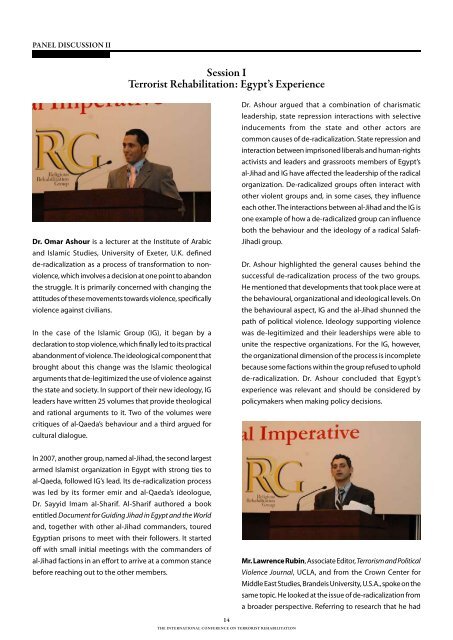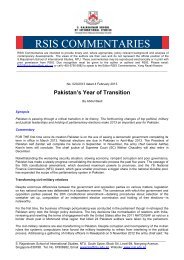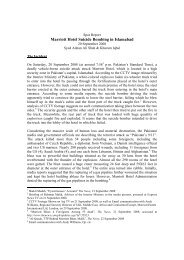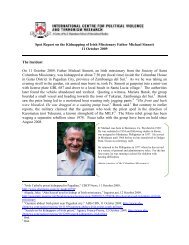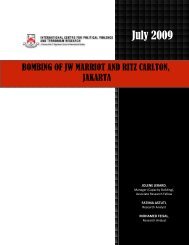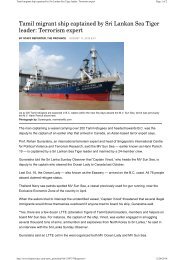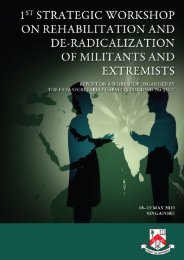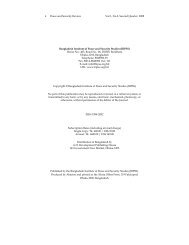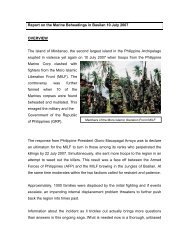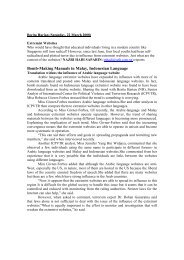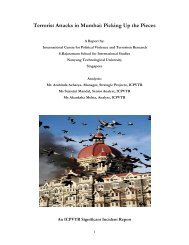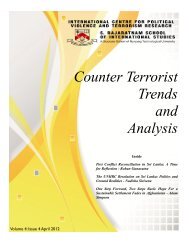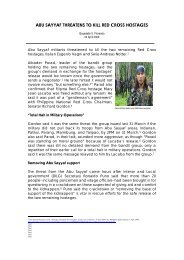International Conference On Terrorist Rehabilitation
International Conference On Terrorist Rehabilitation
International Conference On Terrorist Rehabilitation
Create successful ePaper yourself
Turn your PDF publications into a flip-book with our unique Google optimized e-Paper software.
PANEL DISCUSSION II<br />
Session I<br />
<strong>Terrorist</strong> <strong>Rehabilitation</strong>: Egypt’s Experience<br />
Dr. Omar Ashour is a lecturer at the Institute of Arabic<br />
and Islamic Studies, University of Exeter, U.K. defined<br />
de-radicalization as a process of transformation to nonviolence,<br />
which involves a decision at one point to abandon<br />
the struggle. It is primarily concerned with changing the<br />
attitudes of these movements towards violence, specifically<br />
violence against civilians.<br />
In the case of the Islamic Group (IG), it began by a<br />
declaration to stop violence, which finally led to its practical<br />
abandonment of violence. The ideological component that<br />
brought about this change was the Islamic theological<br />
arguments that de-legitimized the use of violence against<br />
the state and society. In support of their new ideology, IG<br />
leaders have written 25 volumes that provide theological<br />
and rational arguments to it. Two of the volumes were<br />
critiques of al-Qaeda’s behaviour and a third argued for<br />
cultural dialogue.<br />
Dr. Ashour argued that a combination of charismatic<br />
leadership, state repression interactions with selective<br />
inducements from the state and other actors are<br />
common causes of de-radicalization. State repression and<br />
interaction between imprisoned liberals and human-rights<br />
activists and leaders and grassroots members of Egypt’s<br />
al-Jihad and IG have affected the leadership of the radical<br />
organization. De-radicalized groups often interact with<br />
other violent groups and, in some cases, they influence<br />
each other. The interactions between al-Jihad and the IG is<br />
one example of how a de-radicalized group can influence<br />
both the behaviour and the ideology of a radical Salafi-<br />
Jihadi group.<br />
Dr. Ashour highlighted the general causes behind the<br />
successful de-radicalization process of the two groups.<br />
He mentioned that developments that took place were at<br />
the behavioural, organizational and ideological levels. <strong>On</strong><br />
the behavioural aspect, IG and the al-Jihad shunned the<br />
path of political violence. Ideology supporting violence<br />
was de-legitimized and their leaderships were able to<br />
unite the respective organizations. For the IG, however,<br />
the organizational dimension of the process is incomplete<br />
because some factions within the group refused to uphold<br />
de-radicalization. Dr. Ashour concluded that Egypt’s<br />
experience was relevant and should be considered by<br />
policymakers when making policy decisions.<br />
In 2007, another group, named al-Jihad, the second largest<br />
armed Islamist organization in Egypt with strong ties to<br />
al-Qaeda, followed IG’s lead. Its de-radicalization process<br />
was led by its former emir and al-Qaeda’s ideologue,<br />
Dr. Sayyid Imam al-Sharif. Al-Sharif authored a book<br />
entitled Document for Guiding Jihad in Egypt and the World<br />
and, together with other al-Jihad commanders, toured<br />
Egyptian prisons to meet with their followers. It started<br />
off with small initial meetings with the commanders of<br />
al-Jihad factions in an effort to arrive at a common stance<br />
before reaching out to the other members.<br />
Mr. Lawrence Rubin, Associate Editor, Terrorism and Political<br />
Violence Journal, UCLA, and from the Crown Center for<br />
Middle East Studies, Brandeis University, U.S.A., spoke on the<br />
same topic. He looked at the issue of de-radicalization from<br />
a broader perspective. Referring to research that he had<br />
14<br />
THE INTERNATIONAL CONFERENCE ON TERRORIST REHABILITATION


